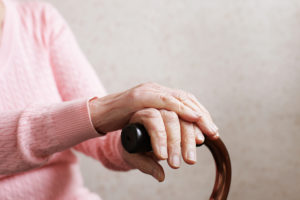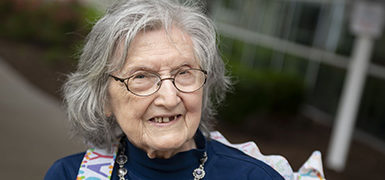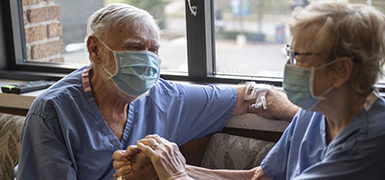
Face masks. Social distancing. Staying home.
The daily life changes brought by the COVID-19 pandemic may be challenging for anyone.
For those with dementia, the new routines are especially stressful.
“Patients are having to cope with rapidly changing information and guidance,” said Heshan Fernando, PhD, a Spectrum Health clinical neurospsychologist. “And they are doing this at a time when we are asked to isolate ourselves from our immediate networks and wider communities.”
To help family members with dementia or mild cognitive impairment navigate the changes, Dr. Fernando advises patience and empathy. And let them know they are not the only ones confused by the changes to daily life.
“It is very helpful for them to know that these are very unfamiliar circumstances for all of us,” he said. “We are all navigating this unprecedented situation together.”
In discussing the new coronavirus, he advises taking into account the person’s ability to understand and cope with the information.
“You don’t want to inundate people with unnecessary information, particularly when it causes anxiety,” he said. “Sometimes it is our job to shield our loved ones from anxiety-provoking information.”
That might mean limiting exposure to news programs or stories about deaths caused by COVID-19.
“When they are in a state of anxiety, worry or confusion, that puts them at increased risk for agitation,” he said.
For those able to discuss the risks, he advises focusing on safety, and being honest about the uncertainty surrounding the issue.
We can tell loved ones we don’t have all the answers. And at the same time, assure them that we are following measures that scientific experts believe will keep us safe.
Those steps include wearing a face mask in public places, such as the doctor’s office. A mask, combined with 6 feet of social distancing, can help reduce the risk of disease transmission.
To ease the acceptance of a face mask, consider one with a fun theme—such as a popular sports team or school colors—that appeal to your loved one.
For those who resist a mask, Dr. Fernando suggests a scarf or bandana, which are potentially less intrusive and may provide at least some protection.
“And for loved ones with dementia who absolutely refuse to wear a mask, if they can at least maintain social distance, perhaps that’s the best available option,” he said. “It is all about finding the best structure that fits you and your loved ones.”
To encourage hand hygiene, Dr. Fernando suggests role modeling and doing it together. Also, consider frequent verbal reminders and visual, eye-catching signage throughout the house.
Because those with dementia find multi-step directions challenging, he advises giving instructions one step at a time in a calm manner.
For example, in putting on a mask, you might tell loved ones to sanitize their hands, then put on the mask and then sanitize their hands again, waiting for each step to be completed before continuing.
When possible, minimize outings that may be challenging.
Consider telehealth visits with doctors and use delivery services for medication, groceries and other essentials.
Find ways to connect socially
Even with the easing of stay-safe, stay-home policies and the opening of public places, the need for keeping older adults safe from the virus remains. They are more likely to be susceptible to infection and to have other health issues that would increase their risk of severe illness.
Whether they live with a family member or in a facility, where visitors may not be allowed, Dr. Fernando suggests arranging virtual visits to ease social isolation and reduce stress.
“I know a lot of people feel this is not the same as being face to face, but there’s a lot of times where these various technologies have been extremely wonderful,” he said.
Some families have held social-distance dinners, joining each other at mealtime on a video app. Churches and support groups also meet online to stay connected.
Window visits and drive-by celebrations, with friends and family holding signs and cheering for special events like birthdays, can also help our loved ones feel connected.
“Is it as good as the real thing? I think everyone would agree it’s not,” Dr. Fernando said. “But it’s still wonderful to have that support. I think it has been a great experience overall for our loved ones, given the circumstances.”
Diversions are also effective. Some have turned to creative activities and long-lost hobbies to create positive experiences in the home—such as do-it-yourself projects, photography, online training courses, model aircraft and even adult coloring books.
And for those who live in an assisted living center or other facility, he advises keeping a whiteboard in the room with key information such as contact information for family members.
In caring for someone with dementia, Dr. Fernando reminds caregivers to be kind to themselves as well.
“The biggest concern I see for caregivers is they don’t get a break,” he said. “That is very tough for them.”
He advised asking family members to lend a hand or consider hiring a home health care provider. Ask the agency about its protocols to reduce the spread of COVID-19. He also encourages caregivers to reach out to their local Alzheimer’s Association chapter for information on virtual sessions, talk with a social worker or therapist or take part in online support groups for caregivers.

 /a>
/a>
 /a>
/a>
 /a>
/a>